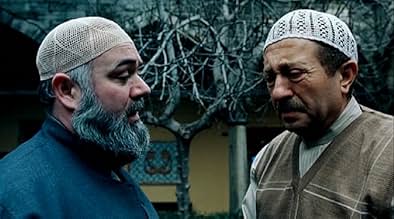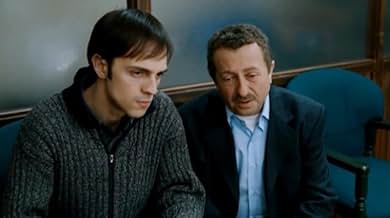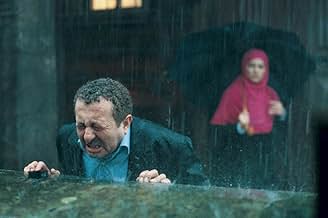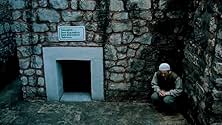NOTE IMDb
7,4/10
14 k
MA NOTE
Ajouter une intrigue dans votre langueA promotion brings a Muslim's relationship with God into question.A promotion brings a Muslim's relationship with God into question.A promotion brings a Muslim's relationship with God into question.
- Réalisation
- Scénario
- Casting principal
- Récompenses
- 19 victoires et 15 nominations au total
Avis à la une
Takva attempts to achieve two things; It is a philosophical drama, and also a quasi-documentary. Putting the main character in a low-profile religious order, and in a ethical conundrum, the movie makers hit two birds with one reel.
Religious orders and their role in the growing politicization of Islam in Turkey is a sensitive subject. The movie refrains from saying much politically, or the characters do not have lines that can be interpreted in such a manner. However, 'Takva the documentary' speaks volumes.
Takva has good actors such as Erkan Can (the lead), a straightforward but engaging story, and a lot to learn from.
Religious orders and their role in the growing politicization of Islam in Turkey is a sensitive subject. The movie refrains from saying much politically, or the characters do not have lines that can be interpreted in such a manner. However, 'Takva the documentary' speaks volumes.
Takva has good actors such as Erkan Can (the lead), a straightforward but engaging story, and a lot to learn from.
10ogsezer
I would like to mention a different side of the movie that sheds light on Sufi or Mevlevi orders in Turkish and Islamic history.
Why Muharrem is selected for this task to perform financial affairs of the order? The answer is related with the stages of knowledge or purity that one has to qualify to become a "Perfect Human Being" or "insan-i kamil" in Turkish. This concept or ideology is rooted with Islamic tradition. Many Sufi or Mevlevi order has this process for their dervishes which may take a lifetime to achieve this goal or even never be able to reach that level of "perfection".
Different than being nun or monk which requires leaving mainstream society and living in the monastery with prayers, last step of this difficult and lengthy process of purifying one's soul from earthly desires, is to be able to return to the real world after so many years lived in contemplation and yet not being disturbed with its appeal to commit sin. I believe in the last few minutes head of the order explains this a little bit. And apparently Muharrem failed to accomplish last stage before achieving "perfection".
Why Muharrem is selected for this task to perform financial affairs of the order? The answer is related with the stages of knowledge or purity that one has to qualify to become a "Perfect Human Being" or "insan-i kamil" in Turkish. This concept or ideology is rooted with Islamic tradition. Many Sufi or Mevlevi order has this process for their dervishes which may take a lifetime to achieve this goal or even never be able to reach that level of "perfection".
Different than being nun or monk which requires leaving mainstream society and living in the monastery with prayers, last step of this difficult and lengthy process of purifying one's soul from earthly desires, is to be able to return to the real world after so many years lived in contemplation and yet not being disturbed with its appeal to commit sin. I believe in the last few minutes head of the order explains this a little bit. And apparently Muharrem failed to accomplish last stage before achieving "perfection".
... seems to be the question at the heart of this Turkish film about a simple man living a simple life until his world is turned upside down when he is suddenly exposed to the modern world in the service of his religion. Muharrem is at the center of this character study. He is a very nondescript looking man of about 40 who has been in the service of sack dealer Ali Bey and his family since childhood. He is called an apprentice, but he acts basically as a stock boy and runner of errands. He has been stuck at this point since he was a child with no hope of being more than he is, and he seems fine with that. He lives a simple life in simple quarters and rigidly adheres to his religious sect's rules without question.
What changes everything is when the leader of his religious sect selects Muhareem to be the organizer of finances for the group. With absolutely no training in this area and no prior exposure to the modern world and culture, he is thrust into a position of authority wandering about town collecting the sect's rents. When he is handed a cell phone to call Rauf - his superior and adviser - in case he has questions during his rounds, he looks as though he has been handed a piece of biomedical equipment that he must somehow assemble.
Muhareem finds himself morally challenged and psychologically troubled when he is exposed for the first time to power, money, and sex. The power comes in the form of regard that he's never had before from people who have previously treated him as though he was invisible. His new sexual temptations come in the form of things as simple as having to walk past a long line of female mannequins dressed in lingerie on his way to collect some rent moneys. Muhareem has never seen such sights before, and soon he is having disturbing dreams. Also, he begins to see an equally troubling change in his own personality that seems to be required for him to do his new job correctly, but goes against the grain of all he has ever believed to be righteous.
This film is set in Turkey and the sect in question is the Sufi branch of Islam, but it could easily be set anywhere in the world and involve any religion - the themes are universal. Highly recommended.
What changes everything is when the leader of his religious sect selects Muhareem to be the organizer of finances for the group. With absolutely no training in this area and no prior exposure to the modern world and culture, he is thrust into a position of authority wandering about town collecting the sect's rents. When he is handed a cell phone to call Rauf - his superior and adviser - in case he has questions during his rounds, he looks as though he has been handed a piece of biomedical equipment that he must somehow assemble.
Muhareem finds himself morally challenged and psychologically troubled when he is exposed for the first time to power, money, and sex. The power comes in the form of regard that he's never had before from people who have previously treated him as though he was invisible. His new sexual temptations come in the form of things as simple as having to walk past a long line of female mannequins dressed in lingerie on his way to collect some rent moneys. Muhareem has never seen such sights before, and soon he is having disturbing dreams. Also, he begins to see an equally troubling change in his own personality that seems to be required for him to do his new job correctly, but goes against the grain of all he has ever believed to be righteous.
This film is set in Turkey and the sect in question is the Sufi branch of Islam, but it could easily be set anywhere in the world and involve any religion - the themes are universal. Highly recommended.
The film is about a devoted man to God and his rise in a Way of Islamic society. The film focuses on an ordinary man's Islamic life to his interference with money affairs and the results of it. The psychological state of the man is analyzed from sociological way as well.
The film is great from two main aspects. The first aspect is Erkan Can's wonderful role play. Enormous acting performance. Just unbelievable. The other great side is, the film is shot at real historical places of Istanbul.
The only weakness of the film is the end part of it. The enormous entrance the psychological and sociological perfectness in the beginning was not given in as good as beginning.
Moreover as a philosopher I would like to comment that this film gives a side of Islamica philosophy both its sociology.
The film is great from two main aspects. The first aspect is Erkan Can's wonderful role play. Enormous acting performance. Just unbelievable. The other great side is, the film is shot at real historical places of Istanbul.
The only weakness of the film is the end part of it. The enormous entrance the psychological and sociological perfectness in the beginning was not given in as good as beginning.
Moreover as a philosopher I would like to comment that this film gives a side of Islamica philosophy both its sociology.
Takva - A Man's Fear of God is one of those films that playfully enact conflicts of fundamental importance for the world we live in. Takva starts off with humble Muharrem, an introverted single man living in Istanbul, being drawn into the inner circle of a Muslim brotherhood he has adhered to ever since his childhood days. When the erudite and strikingly pragmatic leader, Sheikh Cemal, appoints him as his financial organizer, Muharrem gets endowed with all the amenities and trappings of a modern world businessman. He has to collect rent and administer the order's finances. His naive will to live a life according to what he thinks is the will of God clashes not only with his unfulfilled sexual desires, but also with the mechanisms of power within the order. The brothers' lifestyle may be conservative, but they run an organization that is fully intertwined with the present day social, political and economic life of Turkey.
For Muharrem, who hardly understands any of this business, this means that every step he intends to make for the greater glory of God draws him ever deeper into the quagmire of corruption, lies and hypocrisy. The authority he is endowed with now makes him haughty and difficult to deal with, while his accumulated frustration increasingly throws him into literal fits. Everything escalates when he comes face to face with the woman he desires...
The plot for this great film is based on an old folk tale from Turkey about a man who refuses to marry the daughter of his spiritual master although he clearly loves her. In Onder Cakar and Omer Kiziltan's adaptation, the narrative serves to expose the inner mechanisms of puritan Muslim orders and throw light on the mental set-up of its loyal members. The film is pure fun to watch due to countless instances of great irony, a remarkable love for detail and breathtaking scenes of ecstatic rituals. While the filmmakers were very careful not to ridicule the milieu they're depicting, their critical approach accounts for a film that substantially helps understand the way political Islam "works".
For Muharrem, who hardly understands any of this business, this means that every step he intends to make for the greater glory of God draws him ever deeper into the quagmire of corruption, lies and hypocrisy. The authority he is endowed with now makes him haughty and difficult to deal with, while his accumulated frustration increasingly throws him into literal fits. Everything escalates when he comes face to face with the woman he desires...
The plot for this great film is based on an old folk tale from Turkey about a man who refuses to marry the daughter of his spiritual master although he clearly loves her. In Onder Cakar and Omer Kiziltan's adaptation, the narrative serves to expose the inner mechanisms of puritan Muslim orders and throw light on the mental set-up of its loyal members. The film is pure fun to watch due to countless instances of great irony, a remarkable love for detail and breathtaking scenes of ecstatic rituals. While the filmmakers were very careful not to ridicule the milieu they're depicting, their critical approach accounts for a film that substantially helps understand the way political Islam "works".
Le saviez-vous
- AnecdotesTurkey's Official Submission to the Best Foreign Language Film Category of the 80th Annual Academy Awards (2008).
Meilleurs choix
Connectez-vous pour évaluer et suivre la liste de favoris afin de recevoir des recommandations personnalisées
- How long is Takva: A Man's Fear of God?Alimenté par Alexa
Détails
- Date de sortie
- Pays d’origine
- Site officiel
- Langue
- Aussi connu sous le nom de
- Takva, l'homme qui craint dieu
- Lieux de tournage
- Sociétés de production
- Voir plus de crédits d'entreprise sur IMDbPro
Box-office
- Montant brut mondial
- 2 040 826 $US
- Durée1 heure 36 minutes
- Couleur
- Mixage
- Rapport de forme
- 1.85 : 1
Contribuer à cette page
Suggérer une modification ou ajouter du contenu manquant

Lacune principale
By what name was Takva, l'homme qui craint Dieu (2006) officially released in Canada in English?
Répondre























